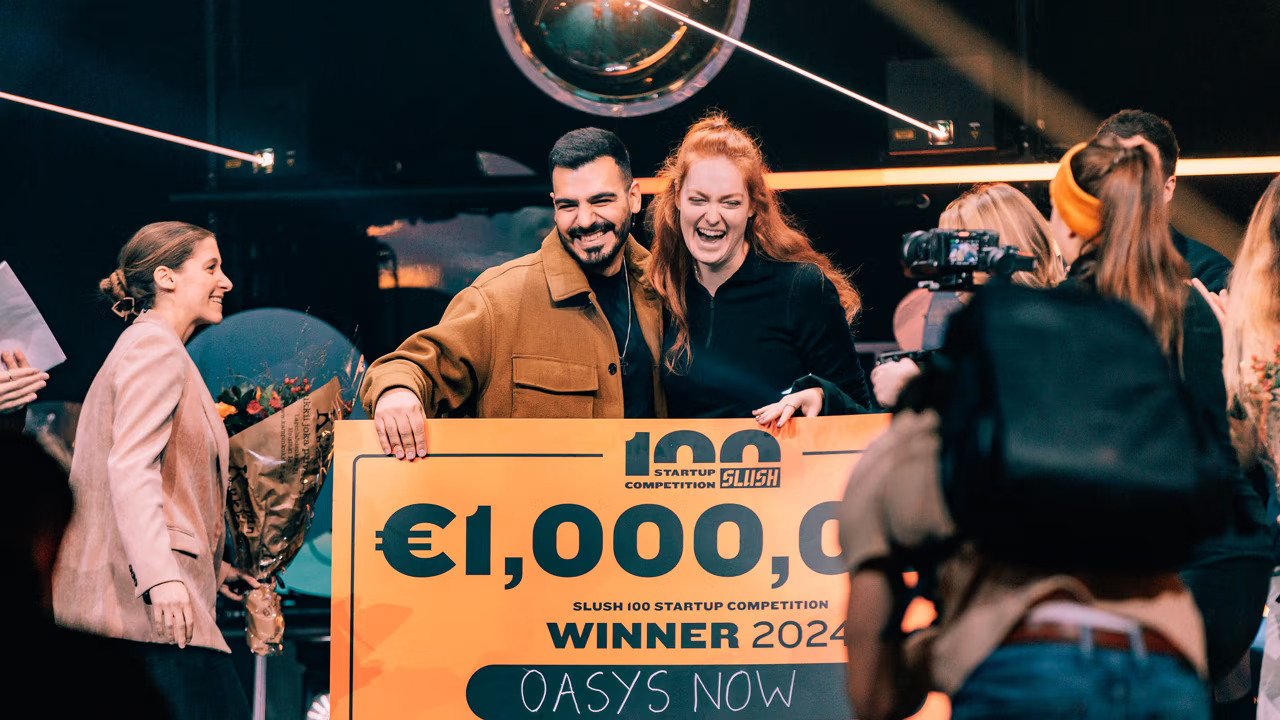Delft-based startup Oasys Now wants to enable personalised healthcare and empower patients to take control of their own data. With the grand prize of €1 million, they intend to continue developing their system for patient data management.
Founders Nima Salami and Sara Okhuijsen won the grand prize of €1 million in investment at the Slush startup competition on 21 November 2024 in Helsinki. (Photo: Petri Anttila)
‘Slush’ is one of the world’s leading startup and tech events. Held annually in Helsinki, Finland, Slush brings together startups, investors, entrepreneurs and tech enthusiasts from around the globe. And this year, on 21 November, the overall winner was a startup from Delft: Oasys Now. They won €1 million to fund their promising system for patient data management.
Patient data management
The management of electronic patient records in the Netherlands has been fraught with challenges since the concept’s inception around 2000. Initially envisioned as the digitisation of healthcare and centralisation of medical records, its implementation faced resistance due to privacy concerns and technical limitations. These issues remain largely unresolved, especially as the volume and complexity of health data continue to grow.
For Oasys Now co-founder Nima Salami, the challenge of inaccessible medical records became personal. After fleeing Iran with his family, he witnessed firsthand the life-altering consequences when his mother was unable to access her asthma medication for months due to missing medical records. As a Computer Science student at TU Delft, he wondered why this could not be digitised. This experience inspired him to work on that idea and advocate for this through talks such as TEDxDelft.
He later teamed up with Nanobiology & Bioinformatician Sara Okhuijsen to establish Oasys Now. Okhuijsen’s motivation stemmed from her studies and research at TU Delft and Erasmus MC, where she discovered that genomic research data was often incomplete, lacked diversity and required larger sample sizes. Accessing this data involved navigating complex regulatory hurdles and labour-intensive consent collection processes.
Their mission is to enable personalised healthcare while empowering patients to take control of their own data. Backed by the new investment, Oasys Now wants to accelerate the startup’s growth on two fronts: technological development and industry partnerships. On the technical front, the funding will be used to expand their team of software, AI and cybersecurity experts. On the clinical side, Oasys Now aims to onboard professionals with medical and clinical trials expertise to enhance adoption and usability across diverse healthcare systems.
Encrypted yet searchable
After over three years of research and development, Oasys Now is poised to redefine patient data management. They are utilising a combination of information technologies that until recently were mainly used by the financial sector.
Their method combines privacy with accessibility—a long-standing paradox in data management. This allows patients to manage their health data, search for clinical trials, and share information with research institutes and healthcare providers.
‘The encrypted data appears as gibberish text but is fully searchable’
How does that work in practice? Through an app, patients can authorise the collection of their medical records from diverse sources, including electronic systems, PDFs and doctor’s notes. If patients are interested in participating in clinical trials or seeking new medication options, the app will notify them of possibilities that match their needs.
Clinical trials
Conversely, organisations can securely query patient databases—encrypted and anonymised—using AI-powered tools. These tools enable automated matching of patients to trials, a task traditionally plagued by inefficiency and human error due to unstructured and heterogeneous data. Current methods require researchers and clinicians to review patient files manually, which takes hours for each patient and an average of thirteen months to assemble a trial cohort.
“This is where we make the difference,” says Salami. “Our platform reduces the patient eligibility screening process from months to minutes. It’s like doing a Google search – running a highly targeted search query – but on encrypted data.”
Oasys Now uses a decentralised approach to AI model training, called federated learning. This means that the AI model is trained on anonymised patient data within hospitals or healthcare facilities without copying the patient data. In addition, Oasys Now trains the model on encrypted data without decrypting it, which makes it confidential federated learning.
“The encrypted data appears as gibberish text but is fully searchable,” explains software engineer Krzysztof Baran. “This ensures that sensitive patient information never leaves the hospital, yet it can still be utilised effectively for research and clinical trial matching.”
This combination of AI with encryption is widely used in finance, but Oasys Now says they will be among the first to apply this combination on a major scale in the healthcare sector.
Scaling for the Future
Currently collaborating with three clinical trial sites, the startup plans to scale its platform globally, ensuring interoperability across different healthcare infrastructures. “Technically, we are ready,” says Salami. “With certification expected next spring, we anticipate going live Europe-wide by Q2 next year.”
- Visit the OASYS NOW website to learn more.
Do you have a question or comment about this article?
j.w.wassink@tudelft.nl


Comments are closed.